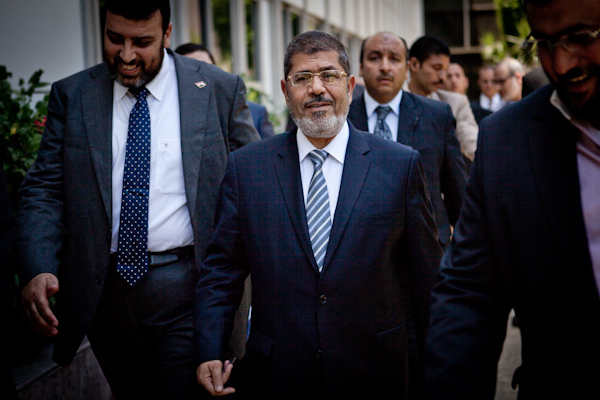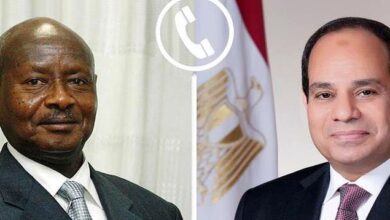
By claiming legislative authorities and canceling a military-issued constitutional charter that gave the Supreme Council of the Armed Forces the right to meddle with the permanent constitution, President Mohamed Morsy denied the military junta any obvious role in the new order, and groomed himself and his Islamist organization as the sole decision makers in Egypt’s transition, analysts say.
This sudden development aroused mixed reactions within the secular bloc.
From the start of the transitional period, secular and democratic groups were squeezed between a rock and a hard place — the military and the Brotherhood. Although many of them refused to swear allegiance to the generals, most of them bet on the military-Islamist power struggles to prevent either party from taking over.
“The SCAF-Brotherhood feuds would have left space for [secularists] to operate and would have prevented the Brothers from monopolizing power,” said Akram Ismail, a youth leader in the Popular Socialist Alliance Party. “But we discovered that the SCAF was too weak to serve as a second pole.”
Morsy took the nation by surprise Sunday when he forced two military leaders into retirement — Field Marshal Hussein Tantawi, the defense minister and commander of the armed forces, and Sami Anan, the armed forces chief of staff. Morsy also declared the annulment of the supplement to the Constitutional Declaration, which the generals had passed in June.
While the supplement had stirred Islamists and many democratic groups for giving the SCAF a privileged position in the political system, it was discreetly hailed by some secularists for curbing Islamist influence over the constitution.
This declaration was passed amid secular-Islamist tension over the makeup of the Constituent Assembly, which was elected by the Islamist-dominated Parliament to draft the constitution. Several secular parties had withdrawn, complaining that the assembly lacked a political balance and that its predominant Islamist nature would pave the way for the promulgation of an Islamist constitution.
This disenchantment led some lawyers to file suits before the administrative court to challenge the legitimacy of the assembly. Shortly after, the generals passed the supplement to the Constitutional Declaration, claiming the right to form a new constituent assembly in case the current one was dissolved.
This provision was widely seen as a warning to the Brotherhood-dominated assembly that the generals could intervene if it fails to pass a constitution that doesn’t please everyone.
Morsy replaced the military decree with a presidential decree Sunday, granting himself the right to form a new assembly if an administrative court orders the dissolution of the assembly in the next hearings scheduled for 24 September.
“This means that now the Brothers have all the powers, whether inside the existing Constituent Assembly or in any future one, in case Morsy decides to form a new one,” complained Bahey el-din Hassan, director of the Cairo Institute for Human Rights Studies.
Any new assembly should draft a constitution in three months from its date of formation, and the final outcome should be put to a public referendum within 30 days, read Morsy’s declaration as written in the official Egyptian Gazette, which publishes new laws.
“This is very dangerous and warns of a new phase where powers will be concentrated in one hand and decisions will be made in a very dictatorial way,” Justice Tahani al-Gebali, vice president of the Supreme Constitutional Court, told Egypt Independent.
Gebali, one of the staunch opponents of Islamists who had offered legal advice to the generals on different occasions, said Morsy now has powers of institutions.
“Now he can remove or revamp any institution without any accountability,” Gebali said.
In the last move, Morsy claimed for himself legislative authorities and the right to ratify the budget. The generals had held these powers since Parliament was dissolved in mid-June.
Hassan, the human rights advocate, offered a colorful analogy to demonstrate the situation of secular forces before and after Morsy’s decision.
Until Sunday, he said, secular democrats resembled a weak person juggling two competing “thugs,” in reference to the SCAF and the Brothers. These forces were not expected to reap any tangible benefits, as neither of the “thugs” was inclined to adopt a genuinely democratic agenda.
“The incumbent assembly did not have a positive position on issues pertaining to human rights or the civil nature of the state, and the assembly that the military was going to form was not expected to have a positive position, either,” said Hassan.
Nevertheless, secularists were immune against a sweeping crackdown in light of Islamist-SCAF struggles, Hassan believes.
“The best option would be to have these thugs keep fighting and competing rather than have one of them win. The victory of either one would be at the expense of the weak person in the middle,” argued Hassan.
He said at least secular democratic groups have not been crushed so far. But with the consolidation of the Brothers’ power, secularists might be at risk.
“If you look at what happened to civil forces in Iran and Sudan, you can foresee the worst scenario that might be waiting for [secular] forces if a religious state is sanctified,” Hassan warned.
Despite their moderate discourse, the Brothers still fail to allay secular fears that they intend to establish a rigid religious rule. Random statements by some of the group’s allies and leaders about the creation of a religious body to vet bills or to revive the Islamic caliphate have fed into these fears.
However, Ismail of the Popular Social Alliance Party, finds Hassan’s fears quite overblown.
An authoritarian religious rule requires a strong state with a robust security apparatus. However, the Egyptian state has been disintegrating since the last decade of Hosni Mubarak’s rule, Ismail argued.
“Hence, the Brothers have one of two options — either to form militias and build an Islamic state the same way Khomeini did in Iran, or they will be forced to create a national reform front with other parties and turn into a quasi-democratic group,” said Ismail, ruling out that Brothers would follow Iranian Islamists’ footsteps, given the group’s reformist rather than revolutionary outlook.
Ismail argued that Morsy must open up to other political forces and relinquish the Brothers’ allegedly autocratic agenda if he wants to address the immense social, political and economic challenges that face his rule.
Since 2006, Egypt has witnessed sweeping protests over socioeconomic grievances emanating from Mubarak’s neoliberal policies and draining national resources. Mubarak’s ouster did not silence these protests. On the contrary, different social segments felt emboldened to voice their demands in more radical forms. Demonstrators blocking roads to protest poor public services or low pay has turned into a trend.
“Morsy has inherited a bad legacy and a failing state,” said Ismail. “Having the Brothers capture the state is not the solution for Egypt’s crisis.”
Instead of “wailing” over the Brothers’ ascent, secular forces shall launch initiatives and exert pressures on the president to introduce democratic reforms, added Ismail.
Amr Hamzawy, the leader of the secular Egypt Freedom Party, seems to have read the moment the same way as Ismail. First, he hailed the president’s decision as a step on the way toward the establishment of a genuinely civilian rule. For the former MP, betting on the generals to guard against religious rule “compromises democratic principles.”
“I cannot compromise democracy by relying on an undemocratic and a non-elected entity,” Hamzawy said in reference to the SCAF.
In the meantime, he admitted that the president’s decision is problematic because it concentrates all power in his hands.
Hamzawy launched an initiative calling on the president to entrust the Constituent Assembly with legislative powers until a new parliament is elected. However, the assembly should be reshuffled first to “guarantee a balanced representation of political powers and social segments,” he said.
If Morsy does not heed demands to trim his newly acquired sweeping powers, “we will take to the streets peacefully,” Hamzawy added.




